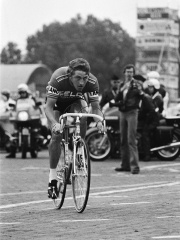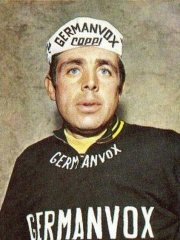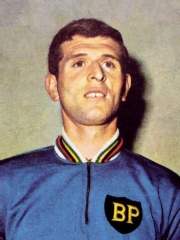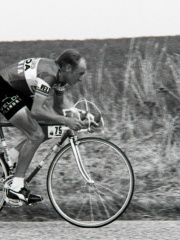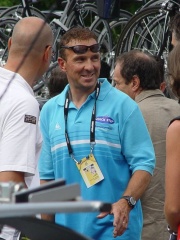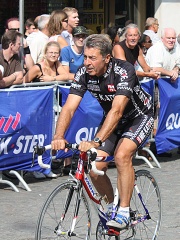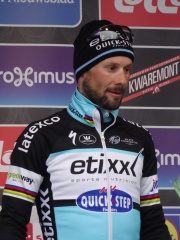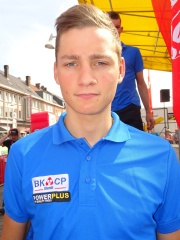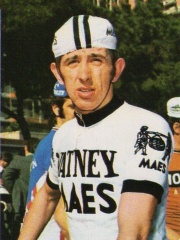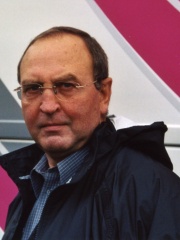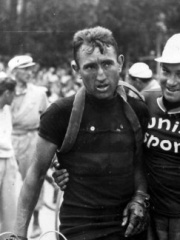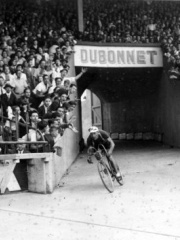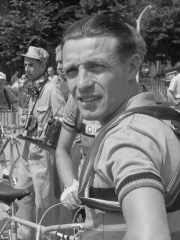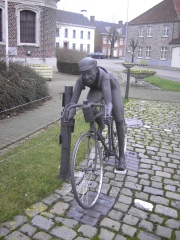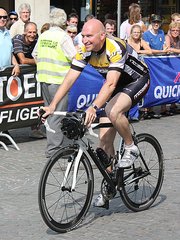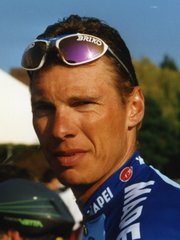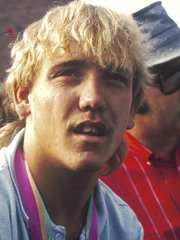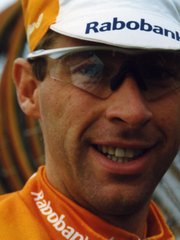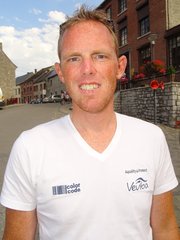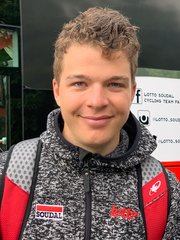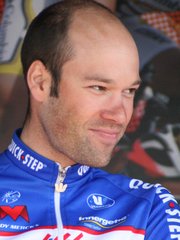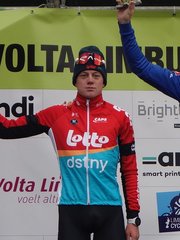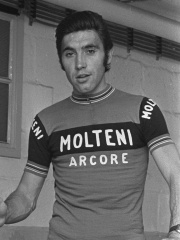
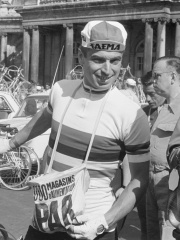
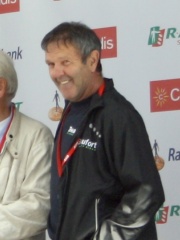
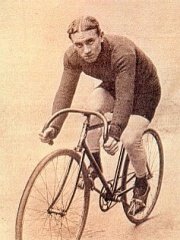
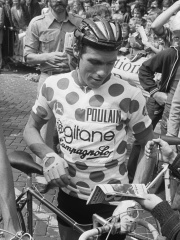
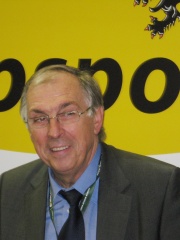
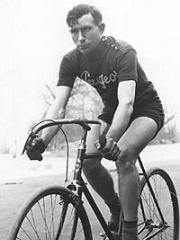
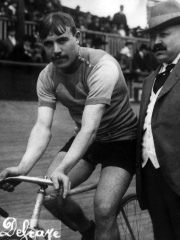
The Most Famous
CYCLISTS from Belgium
Top 10
The following people are considered by Pantheon to be the top 10 most legendary Belgian Cyclists of all time. This list of famous Belgian Cyclists is sorted by HPI (Historical Popularity Index), a metric that aggregates information on a biography's online popularity. Visit the rankings page to view the entire list of Belgian Cyclists.

1. Eddy Merckx (b. 1945)
With an HPI of 76.88, Eddy Merckx is the most famous Belgian Cyclist. His biography has been translated into 67 different languages on wikipedia.
Édouard Louis Joseph, Baron Merckx (born 17 June 1945), is a Belgian former professional road and track cyclist racer who is the most successful rider in the history of competitive cycling. His victories include an unequalled eleven Grand Tours (five Tours de France, five Giros d'Italia, and a Vuelta a España), all five Monuments, setting the hour record, three World Championships, every major one-day race other than Paris–Tours, and extensive victories on the track. Born in Meensel-Kiezegem, Brabant, Belgium, he grew up in Woluwe-Saint-Pierre where his parents ran a grocery store. He played several sports, but found his true passion in cycling. Merckx got his first bicycle at the age of three or four and competed in his first race in 1961. His first victory came at Petit-Enghien in October 1961. After winning 80 races as an amateur, he turned professional on 29 April 1965 when he signed with Solo–Superia. His first major victory came in the Milan–San Remo a year later, after switching to Peugeot–BP–Michelin. After the 1967 season, Merckx moved to Faema, and won the Giro d'Italia, his first Grand Tour victory. Four times between 1970 and 1974, Merckx completed a Grand Tour double. His final double also coincided with winning the elite men's road race at the UCI Road World Championships to make him the first rider to accomplish cycling's Triple Crown. Merckx broke the hour record in October 1972, extending the record by almost 800 metres. He acquired the nickname "the Cannibal", suggested by the daughter of a teammate upon being told by her father of how Merckx would not let anyone else win. Merckx achieved 525 victories over his eighteen-year career. He is one of only three riders to have won all five 'Monuments' (Milan–San Remo, Tour of Flanders, Paris–Roubaix, Liège–Bastogne–Liège, and the Giro di Lombardia) and the only one to have won them all at least twice. Merckx was successful on the road and also on the track, as well as in the large stage races and one-day races. He is almost universally regarded as the greatest and most successful rider in the history of cycling. Since Merckx's retirement from the sport on 18 May 1978, he has remained active in the cycling world. He began his own bicycle brand, Eddy Merckx Cycles, in 1980 and its bicycles were used by several professional teams in the 1980s, 1990s and early 2000s. Merckx coached the Belgian national cycling team for eleven years, stopping in 1996. He helped start and organize the Tour of Qatar from its start in 2002 until its final edition in 2016. He also assisted in running the Tour of Oman, before a disagreement with the organizers led him to step away in 2017.

2. Rik Van Looy (1933 - 2024)
With an HPI of 69.87, Rik Van Looy is the 2nd most famous Belgian Cyclist. His biography has been translated into 29 different languages.
Henri "Rik" Van Looy (20 December 1933 – 17 December 2024) was a Belgian professional cyclist of the post-war period. Nicknamed the King of the Classics or Emperor of Herentals (after the small Belgian city where he lived), he dominated the classic cycle races in the late 1950s and early 1960s. Van Looy was twice world professional road race champion, and was the first cyclist to win all five 'Monuments': the most prestigious one-day classics – a feat since achieved by just two others (both also Belgians: Roger De Vlaeminck and Eddy Merckx). With 367 professional road victories, he ranks second all-time behind Eddy Merckx. Van Looy is ninth on the all-time list of Grand Tour stage winners with thirty-seven victories. These numbers could still have risen had he not been the victim of a significant number of falls resulting in serious injuries. Remarkable was his sporting rivalry with two other cycling legends: namely the successful Rik Van Steenbergen at the beginning of Van Looy's career. Conversely, Van Looy had to face the generational change with a young Eddy Merckx at the end of his career.

3. Roger De Vlaeminck (b. 1947)
With an HPI of 66.54, Roger De Vlaeminck is the 3rd most famous Belgian Cyclist. His biography has been translated into 28 different languages.
Roger De Vlaeminck (Flemish pronunciation: [rɔˈʑeː də ˈvlaːmɪŋk]; born 24 August 1947) is a Belgian former professional racing cyclist. He was described by Rik Van Looy as "The most talented and the only real classics rider of his generation". Nicknamed "The Gypsy" because he was born into a family of traveling clothiers, he is known for exploits in the cobbled classic Paris–Roubaix race, but his performances in other "Monument" races gave him a record that few can match. His record in Paris–Roubaix earned him another nickname, "Monsieur Paris–Roubaix".

4. Philippe Thys (1889 - 1971)
With an HPI of 63.98, Philippe Thys is the 4th most famous Belgian Cyclist. His biography has been translated into 33 different languages.
Philippe Thys (pronounced [fi.lip tis]; Dutch: Philippe Thijs; 8 October 1889 – 16 January 1971) was a Belgian cyclist and three times winner of the Tour de France.
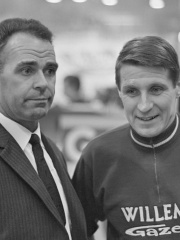
5. Rik Van Steenbergen (1924 - 2003)
With an HPI of 63.74, Rik Van Steenbergen is the 5th most famous Belgian Cyclist. His biography has been translated into 22 different languages.
Hendrik Van Steenbergen (9 September 1924 – 15 May 2003) was a Belgian racing cyclist, considered to be one of the best among the great number of successful Belgian cyclists.

6. Lucien Van Impe (b. 1946)
With an HPI of 63.24, Lucien Van Impe is the 6th most famous Belgian Cyclist. His biography has been translated into 28 different languages.
Lucien Van Impe (Flemish pronunciation: [lyˈɕɛ̃ː vɑn ˈɪmpə]; born 20 October 1946) is a former Belgian cyclist, who competed professionally between 1969 and 1987. He excelled mainly as a climber in multiple-day races such as the Tour de France. He was the winner of the 1976 Tour de France, and six times winner of the mountains classification in the Tour de France.

7. Patrick Sercu (1944 - 2019)
With an HPI of 63.15, Patrick Sercu is the 7th most famous Belgian Cyclist. His biography has been translated into 26 different languages.
Patrick Sercu (27 June 1944 – 19 April 2019) was a Belgian cyclist who was active on the road and track between 1961 and 1983. On track, he won the gold medal in the 1 km time trial at the 1964 Summer Olympics, as well as three world titles in the sprint in 1963, 1967 and 1969. On the road, he earned the green jersey in the 1974 Tour de France. Sercu is the record holder for the number of six-day track race victories, having won 88 events out of 223 starts between 1961 and 1983; several of these wins were with cycling great Eddy Merckx. He also won six stages at the Tour de France and eleven stages at the Giro d'Italia. With 38 national and 15 European championship titles, he is considered as one of the most successful track cyclists ever. In total, he won no less than 1,206 races, of which 168 road races and 1,038 track races.

8. Firmin Lambot (1886 - 1964)
With an HPI of 62.81, Firmin Lambot is the 8th most famous Belgian Cyclist. His biography has been translated into 29 different languages.
Firmin Lambot (pronounced [fiʁ.mɛ̃ lɑ̃.bo]; 14 March 1886 – 19 January 1964) was a Belgian bicycle racer who twice won the Tour de France. Born in the small town of Florennes, Lambot worked as a saddler. He worked 12 hours a day, starting at 6am. He bought his first bicycle at 17 and began riding 50 km a day to and from work. His first race was in a local village; he won five francs as first prize. He then bought a racing bike. He began racing professionally in 1908. In that year he won the championships of Flanders and Belgium. He rode the Tour de France from 1911 to 1913 but the First World War ended the race for the next five years. When the Tour returned in 1919, it was a miserable affair of war-torn roads, fractured logistics and former contenders no longer alive to compete. Only 11 riders finished. Lambot was approached at the Buffalo track in Paris, where he had ridden a 24-hour race, to ride the Tour in the Globe Cycles team. He was second for much of the race but took the lead when Eugène Christophe broke a fork. Observers felt Lambot owed his victory more to Christophe's bad luck than his own ability and a collection for Christophe surpassed the prize money Lambot received. His performance brought him a contract from the larger Peugeot team at 300 francs a month. He was engaged to ride just the Tour de France. In the 1920 and 1921 Tours, Lambot placed respectably and in 1922 he won for the second time after Hector Heusghem was handed a one hour penalty for swapping his bicycle after breaking the frame. He became the first to win the Tour without winning a stage. Lambot was 36 when he won the 1922 Tour, the oldest winner of one of cycling's grand tours at that time. He kept the record for over 90 years, until it was broken by 41-year-old Vuelta winner Chris Horner in 2013. He remains the oldest Tour winner to date. By the end of his career he was paid 1 800 francs a month by his team. In retirement, he returned to work as a saddler.

9. Odile Defraye (1888 - 1965)
With an HPI of 62.26, Odile Defraye is the 9th most famous Belgian Cyclist. His biography has been translated into 26 different languages.
Odile Defraye (pronounced [ɔ.dil dɛ.fʁɛj]; Dutch: Odiel Defraeye; 14 July 1888 – 21 August 1965) was a Belgian road racing cyclist who won three stages and the overall title of the 1912 Tour de France, which was the last tour decided by a points system instead of overall best time. He was the first Belgian to win the Tour and was only invited to join Alcyon's all-French team at a late stage for publicity purposes. In the 1913 Tour de France, Defraye held the overall lead after stages 2 through 5 before relinquishing the lead on the Tourmalet to Stage 6 and eventual winner Philippe Thys. He participated in six tours between 1909 and 1924 but his victory Tour was the only one that he completed. Other major wins include the 1913 Milan–San Remo, a one-day classic, and four stages and the overall for the 1912 Tour of Belgium.
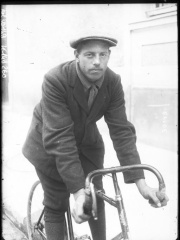
10. Léon Scieur (1888 - 1969)
With an HPI of 62.24, Léon Scieur is the 10th most famous Belgian Cyclist. His biography has been translated into 28 different languages.
Léon Scieur (pronounced [le.ɔ̃ sjœʁ]; 19 March 1888 – 7 October 1969) was a Belgian cyclist who won the 1921 Tour de France, along with stages 3 and 10. His first great victory was the 1920 Liège–Bastogne–Liège; he won a stage and finished fourth in the 1919 and 1920 Tours de France.
People
Pantheon has 184 people classified as Belgian cyclists born between 1882 and 2002. Of these 184, 145 (78.80%) of them are still alive today. The most famous living Belgian cyclists include Eddy Merckx, Roger De Vlaeminck, and Lucien Van Impe. The most famous deceased Belgian cyclists include Rik Van Looy, Philippe Thys, and Rik Van Steenbergen. As of April 2024, 38 new Belgian cyclists have been added to Pantheon including Ludo Dierckxsens, Eric Van Lancker, and Wilfried Peeters.
Living Belgian Cyclists
Go to all RankingsEddy Merckx
1945 - Present
HPI: 76.88
Roger De Vlaeminck
1947 - Present
HPI: 66.54
Lucien Van Impe
1946 - Present
HPI: 63.24
Freddy Maertens
1952 - Present
HPI: 61.28
Guido Reybrouck
1941 - Present
HPI: 57.82
Ferdinand Bracke
1939 - Present
HPI: 57.67
Michel Pollentier
1951 - Present
HPI: 57.43
Johan Museeuw
1965 - Present
HPI: 56.89
Willy Planckaert
1944 - Present
HPI: 56.23
Tom Boonen
1980 - Present
HPI: 55.70
Mathieu van der Poel
1995 - Present
HPI: 55.45
Frans Verbeeck
1941 - Present
HPI: 55.39
Deceased Belgian Cyclists
Go to all RankingsRik Van Looy
1933 - 2024
HPI: 69.87
Philippe Thys
1889 - 1971
HPI: 63.98
Rik Van Steenbergen
1924 - 2003
HPI: 63.74
Patrick Sercu
1944 - 2019
HPI: 63.15
Firmin Lambot
1886 - 1964
HPI: 62.81
Odile Defraye
1888 - 1965
HPI: 62.26
Léon Scieur
1888 - 1969
HPI: 62.24
Walter Godefroot
1943 - 2025
HPI: 62.16
Sylvère Maes
1909 - 1966
HPI: 61.39
Romain Maes
1912 - 1983
HPI: 60.98
Stan Ockers
1920 - 1956
HPI: 60.85
Briek Schotte
1919 - 2004
HPI: 60.56
Newly Added Belgian Cyclists (2025)
Go to all RankingsLudo Dierckxsens
1964 - 2025
HPI: 53.75
Eric Van Lancker
1961 - Present
HPI: 48.76
Wilfried Peeters
1964 - Present
HPI: 47.87
Johan Capiot
1964 - Present
HPI: 47.09
Roger Ilegems
1962 - Present
HPI: 46.54
Cédric Mathy
1970 - Present
HPI: 43.06
Marc Wauters
1969 - Present
HPI: 41.87
Christophe Brandt
1977 - Present
HPI: 40.68
Gianni Vermeersch
1992 - Present
HPI: 40.39
Florian Vermeersch
1999 - Present
HPI: 39.99
Kevin van Impe
1981 - Present
HPI: 39.43
Maxim Van Gils
1999 - Present
HPI: 39.37
Overlapping Lives
Which Cyclists were alive at the same time? This visualization shows the lifespans of the 25 most globally memorable Cyclists since 1700.

